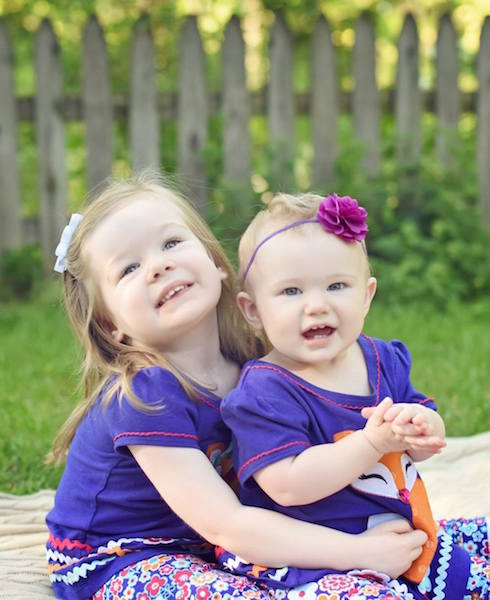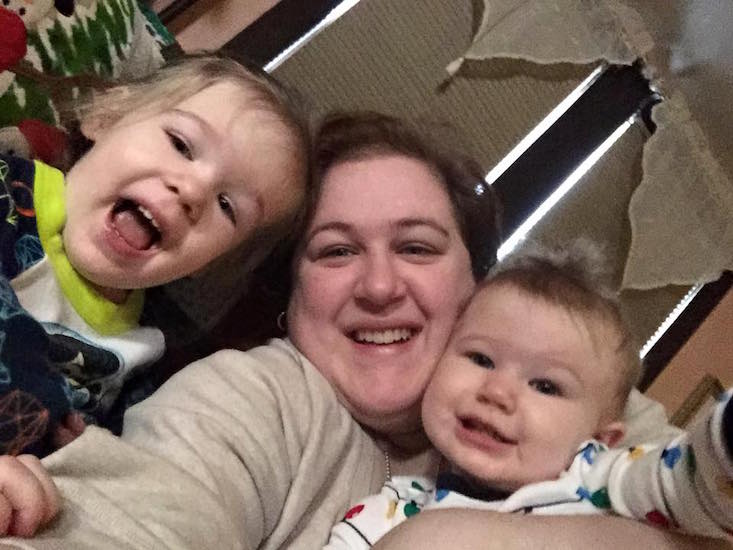Why I'm Speaking Out About Infertility as a Woman With a Disability
We sat in the waiting room. The backs of my legs squeaked against the leather chair. I was fidgeting, my heart pounding. My husband reached over and grabbed my hand. The gesture startled me, but I was happy he was there for me as we waited for the doctor. Finally, my name was called and my husband lifted me from my seat and guided me into the exam room.
I vaguely remember the sound of the doctor entering. Tests were done. Poking and prodding ensued. Photographs were taken. Finally, the doctor had come to his verdict. Our worst fears had been realized; the ophthalmologist declared me blind. A long, grueling battle with breast cancer throughout my 20s had wreaked havoc on my body. Chemo, radiation and steroids had saved my life, but they caused irrevocable damage to other areas — including my optic nerves.
There I was, a 32-year-old, Ivy League-educated woman, thrust into darkness. I was no longer Holly, the capable wife and social worker. I had been bestowed a new label, “disabled.”
Over the next several months, I began receiving various services from different blind organizations to help me adapt to my new disability. I was forced to re-learn everything, from using the stove to doing laundry. By far the hardest obstacle to overcome was mobility training. Using a combination of my hearing and an aluminum white cane, I had to be taught how to cross the street and board a bus. It was absolutely infuriating to me. I was angry at everyone from my husband to God, but the person who got the brunt of my attitude was my mobility instructor, Carol.
After completing a route one afternoon, Carol and I sat in my kitchen. We scheduled our next training session, and she commented on my bad attitude.
“What do you want, Holly?” she asked.
“What do you mean what do I want? I want to be able to see.”
“Well, we both know that’s ‘not’ going to happen. So what else do you want for your life? What do you dream of being?” Carol asked.
Without even thinking, I answered, “A mother. I’ve always wanted to be a mom.”
“It’s possible, Holly,” she said.
“No, it’s not, you don’t know what I’ve been through.”
“Well, I know you’ve been through more than most, but even blind women have babies,” she said.
Just like breast cancer, infertility is a disease, and one in eight couples are affected by it. My husband and I had suffered multiple miscarriages over our 10-year marriage, each loss more heartbreaking than the last.
My gynecologist attributed my infertility to a combination of my cancer treatments and polycystic ovary syndrome (PCOS), a hormonal imbalance that causes insulin resistance and prevents regular ovulation. I had been put on medication to help regulate my periods and decrease some of the PCOS symptoms. Despite taking my medicine regularly, doctors said there was less than a 2 percent chance I would ever conceive and carry a healthy baby to term. It would take a miracle.
Doctors and their statistics, you’ve got to love them!
When I brought up the topic of having children with my doctors after entering remission from my cancer, I was met with constant disapproval.
You’re alive! Can’t you just be happy with that?
What if you get sick again? Would you want your baby to grow up without a mother?
Two percent, that’s your chance of having a child. You’ve got a better shot at winning the lottery.
Two percent. We weren’t talking about low-fat milk here! I was also fairly certain I hadn’t signed some bartering contract stating I could live cancer free “if” I accepted the fact I would never have a child. But no one would address my underlying infertility. My complicated medical history prevented IVF from being a viable option, and I was advised not to harvest my eggs for surrogacy. Domestic adoption agencies were unlikely to accept our application for the same reason. Financially, we were absolutely strapped from all the other medical costs that we had incurred thanks to good ol’ cancer.
Now that I had been declared blind, the consensus was I “just” needed to “be blind” and forgo the idea of motherhood altogether. It felt like I wasn’t even supposed to talk about it. But Carol, the ever-patient mobility instructor, had reminded me that is was OK to speak about my desire to have children. I could talk about my infertility.
Breast cancer survivors “can” battle infertility.
Visually impaired women “can” suffer from infertility.
There is a such a negative stigma attached to parenting while sick or disabled that people may forget infertility can still be an obstacle. My infertility wasn’t a “secondary issue” in relation to my vision loss and cancer. PCOS was a “co-occurring” medical condition preventing me from becoming pregnant.
Society must remember there are no definitive rules that dictate who “gets” to attain the coveted role of “mother.” Infertility does not discriminate. This merciless disease doesn’t care who you know, how much money you have or what hardships you’ve already been forced to endure.
Why should any of us feel ashamed to talk about our infertility?
I had to #startasking myself how I could think more positively about the medical hand I had been dealt.
I had to #startasking my doctors about what I could do to take back control over my own body.
I had to #startasking what additional steps could be taken, if any, to have my concerns about my infertility be taken seriously.
I sought emotional support through counseling. I focused on the “now” and vowed to be more patient with myself as I made the transition from the world of the sighted to the world of the blind. I began to open up to my husband about some of the frustrations I was experiencing. Finally, I asked God for strength because that’s what I needed in that moment.
Six months I worked with Carol — three times a week, one hour a day. With practice, I was able to cross the street. I could make it to the mailbox. I was able to walk the 16 blocks to my local pharmacy to pick up my eye-drops. Small victories happened for me every day, both emotionally and physically.

A few days after graduating from mobility training, a trip to my doctor for what I thought was a stomach bug revealed I was pregnant. After a rough first trimester, we successfully made it to our 20-week anatomy scan.
Our precious little girl was developing normally and although considered very high risk, this once-infertile cancer survivor turned blind woman had defied the odds.
My precious miracle baby was born in February 2013. One year later, we welcomed a second daughter into our family. Every doctor we had ever seen said it couldn’t happen. The doctors were wrong.
In my wildest dreams, I never imagined I would have the privilege of hearing another human being call me “Mommy.” Despite its challenges, and there are many, parenthood should never be taken for granted.
National Infertility Awareness Week is April 24 to April 30.
While my struggle with infertility might be more complicated than others, the immense desire for couples to become parents transcends the medical intricacies of my personal journey. Each of us battling this disease is connected.
I encourage each of you to spread awareness about infertility this week.
If you know someone who may be struggling with this issue, reach out and offer your support.
If you are currently disabled or coping with a long term illness, I urge you to speak with your medical team about your desire to have children.
Listen to their advice.
Weigh your options.
Explore every avenue that’s right for you. #StartAsking.
Infertility already comes with so many hurdles. Please, don’t let the fear of someone else’s judgement about your physical capacity to parent become another. There is no shame in infertility, and there is no reason why “every” person shouldn’t be entitled to talk about it.
Take it from somebody who’s been there.
Don’t be afraid to #startasking.
To learn more about infertility, check out the National Infertility Association at Resolve.org. You can also find out more about the #StartAsking campaign and National Infertility Week by clicking here.

Follow this journey on Blind Motherhood.
The Mighty is asking the following: What’s one thing people might not know about your experience with disability, disease or mental illness, and what would you say to teach them? If you’d like to participate, please send a blog post to community@themighty.com. Please include a photo for the piece, a photo of yourself and 1-2 sentence bio. Check out our Submit a Story page for more about our submission guidelines.
